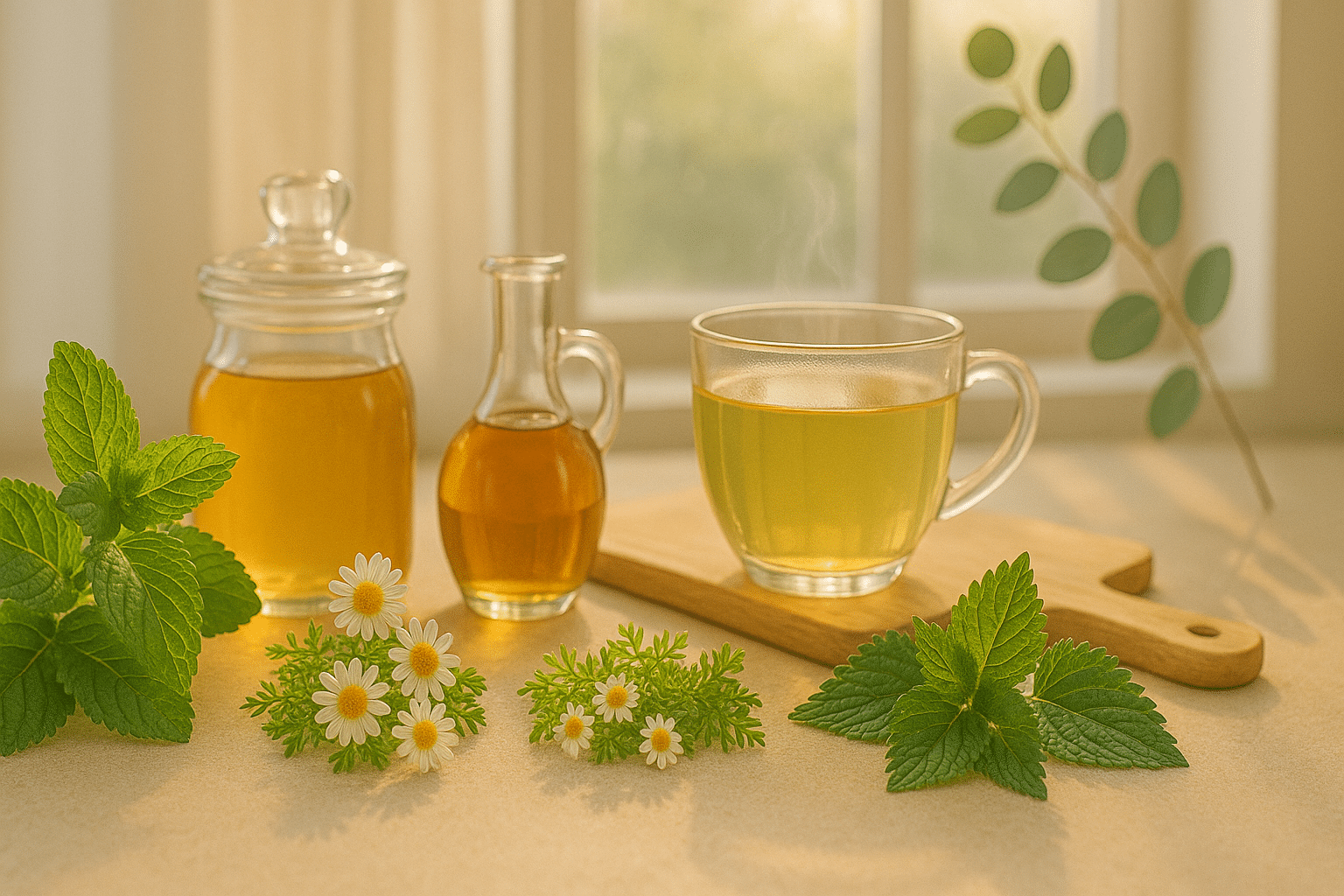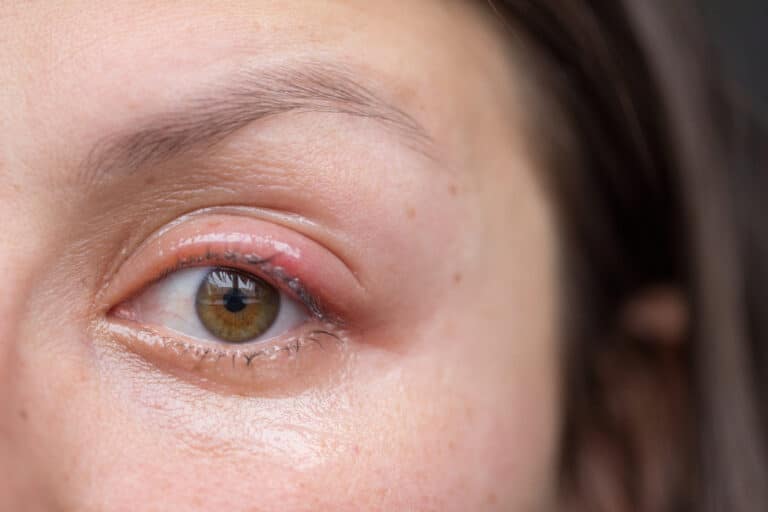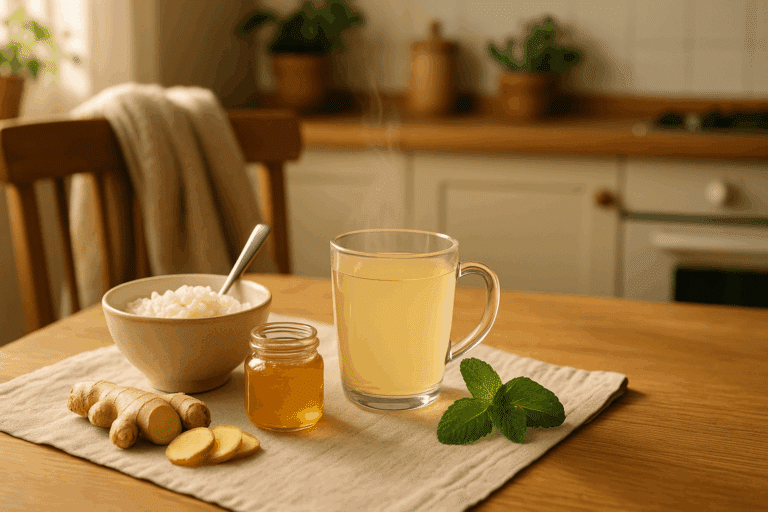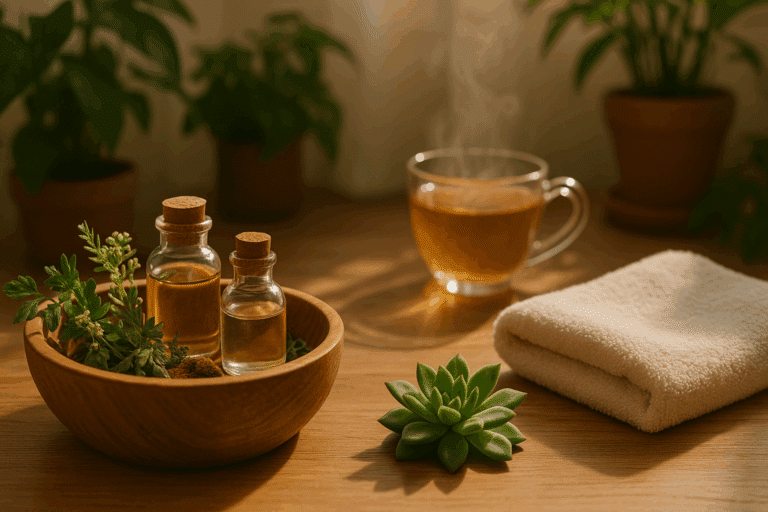Natural Remedies for Seasonal Allergies: Effective Home Treatments Backed by Science

If you’re tired of relying solely on over-the-counter medications for seasonal allergies, exploring natural remedies might be the solution you need. Many effective home treatments are backed by scientific research. From dietary changes to herbal supplements, there are various options to evaluate. But which methods truly stand out in alleviating symptoms and improving your quality of life? Let’s uncover the most promising strategies together.
Dietary Approaches to Alleviate Allergy Symptoms
When it comes to alleviating seasonal allergy symptoms, your diet can play an essential role. Focus on anti-inflammatory foods, as they can help reduce swelling and irritation in your nasal passages and throat. Adopting a Mediterranean diet rich in fruits, vegetables, fish, and olive oil can diminish respiratory allergies. Incorporate omega-3 fatty acids from fatty fish or plant sources like walnuts and flaxseeds to stabilize cell membranes and minimize histamine release.
A balanced, anti-inflammatory diet supports immune system and overall health, making it a critical component of allergy management. Additionally, foods high in vitamin C boost your intake of vitamin C through citrus fruits and leafy greens, which act as natural antihistamines. Foods high in quercetin, such as red onions and berries, can further stabilize mast cells.
Finally, prioritize gut health with probiotics to enhance your immune response and alleviate allergy symptoms. Including fruits rich in antioxidants can also help combat free-radical damage and reduce inflammation.
Herbal Remedies and Supplements for Relief
If you’re seeking natural ways to ease seasonal allergies, herbal remedies and supplements might offer effective relief.
Butterbur extracts can alleviate hay fever symptoms and may rival antihistamines without sedative effects. Recent studies have shown that butterbur is effective for nasal allergies, making it a promising option for those looking for alternatives to conventional treatments. It is crucial to ensure that you use processed butterbur products to avoid potential harmful effects associated with unprocessed forms.
Stinging nettle acts as a natural antihistamine and can be consumed in various forms, though results vary.
Quercetin, a plant flavonoid, helps block histamine release and is best taken before allergy season for maximum benefits.
Spirulina, a blue-green algae, shows promise in improving nasal symptoms and may outperform some allergy medications, though further research is needed.
Always consult with a healthcare provider before starting any new supplement to guarantee safety and efficacy tailored to your specific needs.
The Benefits of Nasal Irrigation and Saline Rinses
Nasal irrigation and saline rinses are gaining popularity as effective natural remedies for seasonal allergies. These methods flush your nasal passages, removing allergens like pollen and dust while thinning excess mucus. By washing out inflammatory mediators, you can considerably reduce allergy symptoms such as nasal obstruction and sneezing.
Studies show that regular use can lead to a 27.66% improvement in symptoms and even a 60% reduction in severity for chronic sinus sufferers. Plus, they can decrease your reliance on allergy medications, providing drug-free relief with minimal side effects. Generally safe for both adults and children, nasal irrigation enhances your quality of life while potentially preventing secondary sinus infections. Additionally, sinus rinsing can help promote mucus flow, further alleviating discomfort during allergy season.
Consider incorporating this simple routine into your allergy management plan, as it is an inexpensive and easy method for relieving upper respiratory symptoms. Regular use of nasal irrigation can also decrease the likelihood of sinus infections, making it a valuable addition to your health regimen.
Lifestyle Changes for Managing Allergies
Managing seasonal allergies effectively often requires more than just remedies; it also involves making thoughtful lifestyle changes.
Start by minimizing your exposure to allergens outdoors. Monitor pollen forecasts and limit outdoor activities when counts are high. When you go out, wear sunglasses and a hat to block pollen, and consider a face mask for yard work.
Indoors, keep windows closed and use air conditioning to filter air. Change clothes and shower when you come inside, and avoid line-drying laundry outdoors. Utilize allergy testing to accurately identify specific triggers that may worsen your symptoms. Identifying specific triggers can help you take targeted steps to avoid allergens and reduce your symptoms. Additionally, remember to maintain indoor humidity below 50% to prevent dust mites and mold from thriving.
Improve indoor air quality with HEPA filters and maintain humidity below 50%. Regularly wash bedding in hot water and reduce clutter to decrease dust.
Stay hydrated and manage stress through relaxation techniques to support your immune health.
Probiotics and Gut Health in Allergy Management
Probiotics can play an essential role in modulating your immune system and managing allergy symptoms. Certain strains, like *Lactobacillus* and *Bifidobacterium*, have shown effectiveness in balancing immune responses and reducing inflammation. Additionally, these probiotics contribute to a diverse gut microbiota, which is crucial for enhancing immune responses and reducing the severity of allergic reactions.
A diverse microbiome trains the immune system to differentiate between harmful and harmless antigens, further supporting the management of allergic conditions. Research suggests that an imbalanced microbiome can lead to overreactions to allergens, highlighting the importance of maintaining gut health in allergy management.
Immune System Modulation
How can you support your immune system to combat seasonal allergies? One effective strategy is to focus on your gut health.
Your gut microbiota plays a significant role in educating and modulating your immune system. By maintaining microbial diversity, especially in early life, you can reduce your risk of allergies. Probiotics can help balance your immune responses, shifting towards a more tolerant Th1 response, which may lessen allergic reactions. They also promote regulatory T-cells (Tregs), essential for tolerating harmless substances like pollen. Additionally, probiotics strengthen your gut barrier, preventing allergens from triggering immune reactions.
Incorporating fiber-rich foods can boost beneficial bacteria, producing anti-inflammatory metabolites that support immune stability, helping you manage seasonal allergies more effectively. Furthermore, general digestive analysis can provide insights into your gut health, allowing you to tailor your probiotic intake for optimal allergy management. Studies show that dysbiotic gut microbiota is linked to the development of allergic diseases, highlighting the importance of a balanced microbiome in allergy prevention.
Specific Strain Effectiveness
Numerous studies highlight the effectiveness of specific *Lactobacillus* and *Bifidobacterium* strains in managing seasonal allergies.
For instance, *Lactobacillus acidophilus* L-92 reduced eye and nasal symptoms notably in those with cedar pollen allergies. Similarly, *Lactobacillus paracasei* LP-33 improved quality of life for allergic rhinitis patients, showing effects akin to cetirizine.
*Bifidobacterium longum* BB536 also demonstrated relief in clinical symptoms for children suffering from pollen-induced allergies. When combined, strains like *L. acidophilus* NCFM® and *B. lactis* Bl-04 reduced nasal inflammation by around 20%. These specific strains not only alleviate symptoms but also support gut health, creating a balanced immune response that helps you manage seasonal allergies more effectively. Furthermore, recent research suggests that specific probiotics may offer a novel therapeutic approach for individuals with allergic rhinitis.
Additionally, these probiotics can shift immune response from a Th2-dominant profile to a balanced Th1/Th2 profile, enhancing their effectiveness in allergy management. Notably, probiotic Lactobacillus acidophilus L-92 and yeast fermentate have been shown to effectively reduce inflammatory antibodies, providing further support in managing seasonal allergies.
Consider incorporating these probiotic strains into your routine for better relief.
Alternative Therapies: Acupuncture
As you explore relief from seasonal allergies, alternative therapies like acupuncture can offer promising options. Acupuncture has shown significant symptom reduction in some patients and may decrease your need for antihistamines. By targeting specific points on your body, acupuncture could help modulate your immune response and reduce inflammation.
Specific points targeted for allergies may be on the front of the body: hands, feet, face, and ears. Additionally, acupuncture promotes balance and wellness in the body, further enhancing its effectiveness for allergy sufferers. In fact, over 500 million individuals are affected by allergic rhinitis globally, highlighting the widespread need for effective treatments.
Frequently Asked Questions
Can Seasonal Allergies Worsen Over Time?
Yes, your seasonal allergies can worsen over time. Factors like age, exposure to allergens, hormonal changes, and stress can increase severity. Staying aware of these influences helps you manage and potentially mitigate your allergy symptoms.
Are There Any Side Effects of Using Nasal Irrigation?
Yes, there are side effects of nasal irrigation. You might experience mild irritation, a burning sensation, or even nosebleeds if overused. Always use sterile water and clean your device to avoid infections and complications.
How Long Do Seasonal Allergy Symptoms Typically Last?
Seasonal allergy symptoms usually last as long as the allergens are present. You might experience symptoms for weeks or months, depending on your exposure to specific pollen types and your individual sensitivity levels.
Can Pets Trigger Seasonal Allergies in Humans?
Yes, pets can trigger seasonal allergies in you. They carry outdoor allergens like pollen and mold on their fur, which increases your exposure indoors, potentially worsening symptoms if you’re already sensitive to these allergens.
When Is the Best Time to Take Allergy Medications?
The best time to take allergy medications is in the morning, especially if you suffer from hay fever. This timing helps you stay ahead of rising pollen counts, ensuring you get all-day relief from symptoms.
Conclusion
Incorporating these natural remedies into your daily routine can markedly ease your seasonal allergy symptoms. By focusing on a balanced diet, exploring herbal supplements, and practicing nasal irrigation, you can take control of your health. Don’t forget the power of probiotics to support your gut and immune system. With a few lifestyle adjustments, you can improve your quality of life during allergy season. Embrace these science-backed strategies and breathe easier this spring!
References
- https://spitalzollikerberg.ch/en/blog/hay-fever
- https://swedishcovenant.org/community/patient-stories-wellness-articles-and-blogs/wellness-articles/diet-and-lifestyle/five-diet-changes-to-reduce-seasonal-allergies
- https://www.drmayankshukla.com/can-changing-your-diet-affect-your-seasonal-allergies/
- https://www.drfuhrman.com/blog/131/does-diet-influence-seasonal-allergies
- https://www.flonase.com/allergies/food-for-seasonal-allergies/
- https://regeneratehealthmc.com/blog/a-natural-approach-to-managing-seasonal-allergies/
- https://www.mayoclinic.org/diseases-conditions/hay-fever/diagnosis-treatment/drc-20373045
- https://www.hollandandbarrett.com/the-health-hub/conditions/allergies/hayfever/guide-hayfever-remedies-relief/
- https://www.hollandandbarrett.com/the-health-hub/conditions/allergies/allergy-help/naturally-treat-allergies-2/
- https://www.rupahealth.com/post/7-proven-ways-to-get-seasonal-allergy-relief






